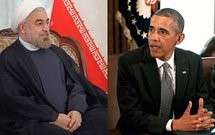 By opting for negotiations with the United States, the Islamic Republic of Iran has exhibited unprecedented behavioral changes. The extent to which Iran will move away from its decades-old radical foreign policy is not clear even to its own leadership.
By opting for negotiations with the United States, the Islamic Republic of Iran has exhibited unprecedented behavioral changes. The extent to which Iran will move away from its decades-old radical foreign policy is not clear even to its own leadership.
It is this lack of clarity that has the country's powerful elite military force, the Islamic Revolutionary Guard Corps, leading the resistance to normalize ties with Washington, a strategy that Iranian President Hassan Rouhani is pursuing with the backing of Supreme Leader Ayatollah Ali Khamenei.
The Islamic Revolutionary Guard Corps organized demonstrations held Monday, the 34th anniversary of the Iran hostage crisis, during which 52 U.S. diplomats were held in Tehran for 444 days. Two days ago, the Corps issued a statement saying it would retain the "Death to America" slogan even if there were a detente with the United States.
Elsewhere, the top commander of the Iranian military, Maj. Gen. Hassan Firouzabadi, said that the country's armed forces fully supported the government's nuclear negotiations, adding that the "Death to America" slogan was directed only toward the 1 percent of Americans who are "hegemonic, capitalist and American Zionist." A day earlier, the supreme leader gave a speech in which he fully supported the negotiations, saying that the team of negotiators led by Foreign Minister Javad Zarif is "engaged in a difficult mission" and emphasizing that "no one should weaken them or insult them."
Clearly, the Iranian leadership is in a predicament on how to move away from the foreign policy posture it has held since the inception of the clerical regime. It is only natural that Tehran has found this difficult. It is not merely a change of policy; it is a paradigm shift. After all, the Iranian revolution was heavily steeped in opposition to U.S. foreign policy, given the close relationship between Washington and the monarchy that was toppled by the movement led by Ayatollah Ruhollah Khomeini, the founder of the Islamic republic.
Since hostility toward the United States is as old as the Islamic republic itself, many within the regime question whether Iran can truly be a revolutionary state, in line with the vision of its founders, if it normalizes relations with Washington. All the pillars of power in Iran are struggling with the change in track, but the Islamic Revolutionary Guard Corps in particular fears that its institutional interests could be sacrificed during negotiations between the Rouhani government and the Obama administration. U.S. sanctions have targeted the Corps specifically as one of the world's largest supporters of terrorism.
However, the Corps realizes that talks are necessary for the future well-being of the regime, and thus it does not oppose the dialogue outright. Instead, it wants to ensure that its status as a major center of power in the Islamic republic is not compromised. For this reason, it has been campaigning to limit the scope of diplomatic engagement with the United States. Its efforts have not gone well, given that most of the regime's power centers are in favor of pursuing the diplomacy and that its 34th anniversary demonstrations drew a crowd of only about 30,000 people.
Beyond the obvious material interest at stake is the question of how to reorient the Corps and the republic to adapt to new geopolitical circumstances. At the heart of this dilemma is the question of whether Iran can remain a revolutionary state with an independent foreign policy if it even partially resolves its issues with the United States. This is a concern not just for the Islamic Revolutionary Guard Corps, but for all the stakeholders in the regime.
Courtesy : Stratfor (www.stratfor.com)